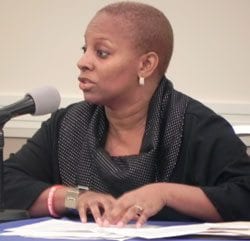

| Above: Angela Bruce, senior policy advisor at Oxfam International, speaks at Ford Hall Forum’s “Haiti and Aid Effectiveness.” Below: Ronald Bernard experienced first-hand the devastation of the earthquake that struck Haiti last year. (Richard Caesar photos) |
Almost 15 months to the day of the massive earthquake that rocked Haiti, more than half a million Haitians are still displaced and many still rely on humanitarian aid.
This is why the effectiveness of aid and the challenges of the rebuilding efforts took center stage last month at the Ford Hall Forum’s free public lecture and discussion, “Haiti and Aid Effectiveness.”
The scale of the Haiti disaster coupled with the slow, tainted process of the recent election, has made the rebuilding process a daunting task, most observers agree.
Panelists at the discussion, including Oxfam Senior Policy Advisor Angela Bruce, talked about that process of rebuilding. Oxfam operates throughout the world, in developing countries with the aim of fighting poverty and aiding development. Bruce said she was “cautiously optimistic” about the recovery efforts and Oxfam’s role in Haiti.
“Yes, the process has been a little slow, and a lot of that has to do with the crisis after crisis that Haiti has been facing,” Bruce said. “That being said, there is a plan … the Haitian people have a plan for what they want to see done and once the government is in place, they will formulate their own plans as well.”
She explained that a lot would depend on the effectiveness of the new Haitian government.
“The people in Haiti and in the international community want a legitimate, functioning, credible government,” she said. “This is key to anything that’s going to happen. The development process is not going to happen outside the government. The reality is that the development and reconstruction process must happen in conjunction with what the Haitian people want and what the Haitian government wants.”
Bruce said that even though Oxfam has been working in the spontaneous camp settlements, distributing clean water and sanitation services since the earthquake, the time has come to move beyond the stage of free aid.
“The fact is, it is a difficult way to give aid now,” she explained. “It’s not in the best or the sustainable interest of Haiti to have aid continue to be delivered in this manner. Moving to reconstruction and toward development is the part that needs to be done.”
The other member of the two-person panel, Ronald Bernard, is Haitian and experienced the January 2010 earthquake and spent another six months in Haiti helping with the initial aid effort before returning to the United States. He too believes there needs to be re-evaluation of how aid is being delivered.
“There is a big gap now between the needs and how the aid has been structured,” he said. “I don’t think they’re taking into account the needs of the people. There should be a reform in the aid so that they can better help Haitians to be independent.”
Bernard also said he felt as though some aid organizations were “competing” with each other by trying to work on the same projects. He said this only resulted in wasted resources that could have been put to better use.
“If we are all trying to reach the same goal then if I am working on something here then you can work on something else over there that’s needed, and altogether we get to our point,” he said. “… [But] if we are competing, then it’s not an efficient way of fixing the many problems we have. So there is a lack of coordination on that level.”
Questions and comments from the audience ranged from members of the diaspora seeking information on what they can do to be included in the rebuilding efforts, to contentious challenges about the legitimacy of the U.S. relationship with the new Haitian government.
In a presidential run-off Michael Martelly, a controversial musician, managed to cruise to an easy victory against former first lady Mirlande Manigat. This was a crucial topic for some audience members since many aid organizations, including Oxfam and the United States Agency for International Development, or USAID, have been waiting for a new government to take charge, in order to institute some of their larger programs.
Bruce was quick to point out that “life still goes on in Haiti” and that people were still receiving help with everyday needs despite the hold-off on larger projects.
Not all of the dialogue was grim. Some audience members shared stories and reports of progress that was being made. One student shared information about scholarships being offered to Haitian students by the government of Senegal. Bruce shared an anecdote that highlighted the effectiveness of USAID’s efforts to clear away rubble, which has been one the biggest obstacles to rebuilding. An estimate from the Interim Haiti Relief Council claims it would cost approximately $200 million to remove 40 percent of the rubble by the end of this year.
Bruce later talked about Oxfam’s goals and how the organization plans to move forward in Haiti.
“Aid now has to be thought of not in terms of just giving but also institutional building,” she said. “Right now, we are moving away from just straight humanitarian relief and more toward creating local partnerships in Haiti with local institutions and mayors. This builds institutional capacity at a local level and can eventually be expanded. But we must start somewhere.”






